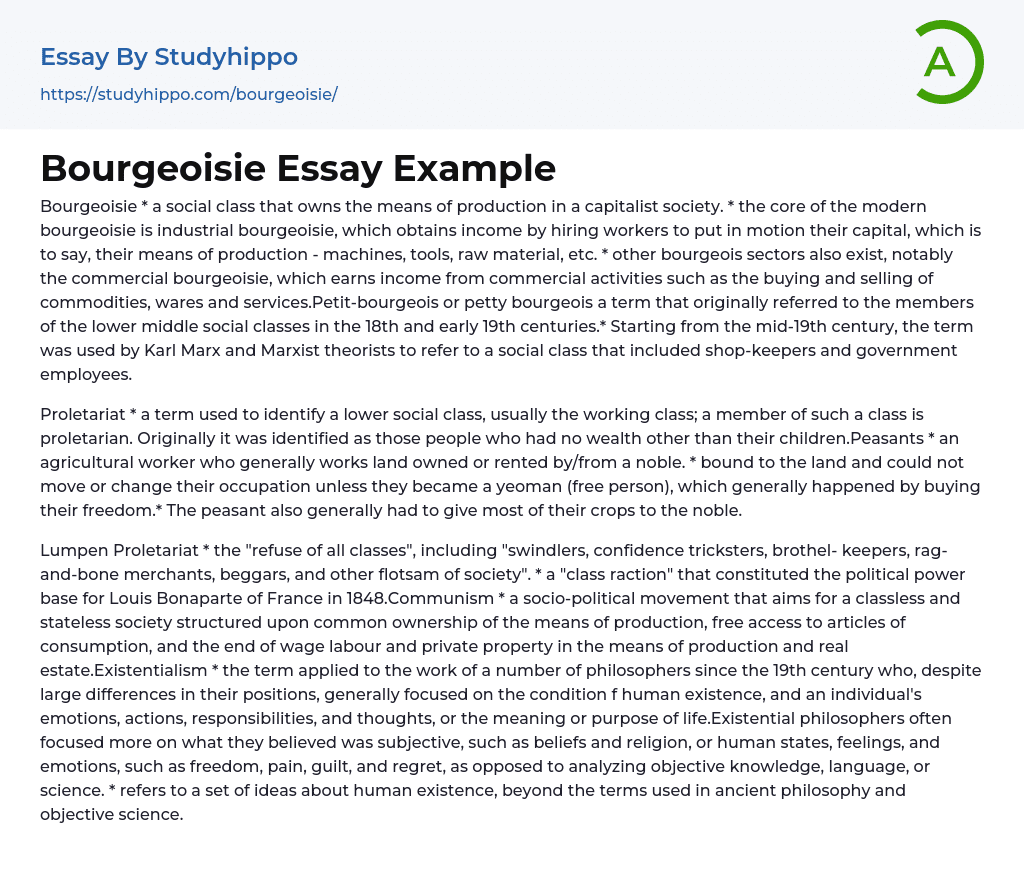Bourgeoisie
- a social class that owns the means of production in a capitalist society.
- the core of the modern bourgeoisie is industrial bourgeoisie, which obtains income by hiring workers to put in motion their capital, which is to say, their means of production - machines, tools, raw material, etc.
- other bourgeois sectors also exist, notably the commercial bourgeoisie, which earns income from commercial activities such as the buying and selling of commodities, wares and services.
Petit-bourgeois or petty bourgeois a term that originally referred to the members of the lower middle social classes in the 18th and early 19th centuries.
Starting from the mid-19th century, the term was used by Karl Marx and Marxist theorists to refer to a social class that included shop-keepers and government employees.
Proletariat
a term used to identify a lower social class, usually the working class; a member of such a class
...is proletarian. Originally it was identified as those people who had no wealth other than their children.
Peasants
- an agricultural worker who generally works land owned or rented by/from a noble.
- bound to the land and could not move or change their occupation unless they became a yeoman (free person), which generally happened by buying their freedom.
- The peasant also generally had to give most of their crops to the noble.
Lumpen Proletariat
- the "refuse of all classes", including "swindlers, confidence tricksters, brothel- keepers, rag-and-bone merchants, beggars, and other flotsam of society".
- a "class raction" that constituted the political power base for Louis Bonaparte of France in 1848.Communism
- a socio-political movement that aims for a classless and stateless society structured upon common ownership of the means of production, free access to articles of consumption,
and the end of wage labour and private property in the means of production and real estate.
Existentialism
the term applied to the work of a number of philosophers since the 19th century who, despite large differences in their positions, generally focused on the condition f human existence, and an individual's emotions, actions, responsibilities, and thoughts, or the meaning or purpose of life.
Existential philosophers often focused more on what they believed was subjective, such as beliefs and religion, or human states, feelings, and emotions, such as freedom, pain, guilt, and regret, as opposed to analyzing objective knowledge, language, or science.
- refers to a set of ideas about human existence, beyond the terms used in ancient philosophy and objective science.
- Absolutism essays
- Appeal essays
- Bourgeoisie essays
- Contras essays
- Corporate Governance essays
- Corruption essays
- Democracy essays
- Democratic Party essays
- Developed Country essays
- Dictatorship essays
- Elections essays
- European Union essays
- Federalism essays
- Foreign essays
- Foreign policy essays
- Gentrification essays
- Hillary Clinton essays
- Income Tax essays
- International Relations essays
- John Marshall essays
- John Stuart Mill essays
- Left-Wing Politics essays
- Liberty essays
- Military essays
- Monarch essays
- Monarchy essays
- Political Corruption essays
- Political Party essays
- Political Science essays
- President Of The United States essays
- Public Service essays
- Red Cross essays
- Reform essays
- Republic essays
- Revenge essays
- Social Security essays
- Sovereign State essays
- State essays
- Supply essays
- Terrorism essays
- United Nations essays
- World Trade Organization essays
- Albert Camus essays
- Aristotle essays
- Carl Jung essays
- Henry David Thoreau essays
- Immanuel Kant essays
- John Dewey essays
- Karl Marx essays
- Machiavelli essays




